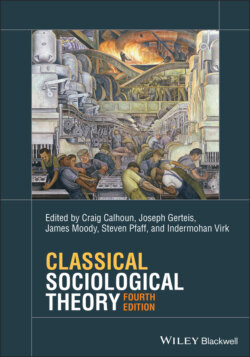Читать книгу Classical Sociological Theory - Группа авторов - Страница 36
Of the Rights of Soveraignes by Institution
ОглавлениеA Common-wealth is said to be Instituted, when a Multitude of men do Agree, and Covenant, every one, with every one, that to whatsoever Man, or Assembly of Men, shall be given by the major part, the Right to Present the Person of them all, (that is to say, to be their Representative;) every one, as well he that Voted for it, as he that Voted against it, shall Authorise all the Actions and Judgements, of that Man, or Assembly of men, in the same manner, as if they were his own, to the end, to live peaceably amongst themselves, and be protected against other men.
From this Institution of a Common-wealth are derived all the Rights, and Facultyes of him, or them, on whom the Soveraigne Power is conferred by the consent of the People assembled.
First, because they Covenant, it is to be understood, they are not obliged by former Covenant to any thing repugnant hereunto. And Consequently they that have already Instituted a Commonwealth, being thereby bound by Covenant, to own the Actions, and Judgements of one, cannot lawfully make a new Covenant, amongst themselves, to be obedient to any other, in any thing whatsoever, without his permission. And therefore, they that are subjects to a Monarch, cannot without his leave cast off Monarchy, and return to the confusion of a disunited Multitude; nor transferre their Person from him that beareth it, to another Man, or other Assembly of men: for they are bound, every man to every man, to Own, and be reputed Author of all, that he that already is their Soveraigne, shall do, and judge fit to be done: so that any one man dissenting, all the rest should break their Covenant made to that man, which is injustice: and they have also every man given the Soveraignty to him that beareth their Person; and therefore if they depose him, they take from him that which is his own, and so again it is injustice. Besides, if he that attempteth to depose his Soveraign, be killed, or punished by him for such attempt, he is author of his own punishment, as being by the Institution, Author of all his Soveraign shall do: And because it is injustice for a man to do any thing, for which he may be punished by his own authority, he is also upon that title, unjust. And whereas some men have pretended for their disobedience to their Soveraign, a new Covenant, made, not with men, but with God; this also is unjust: for there is no Covenant with God, but by mediation of some body that representeth Gods Person; which none doth but Gods Lieutenant, who hath the Soveraignty under God. But this pretence of Covenant with God, is so evident a lye, even in the pretenders own consciences, that it is not onely an act of an unjust, but also of a vile, and unmanly disposition.
Secondly, Because the Right of bearing the Person of them all, is given to him they make Soveraigne, by Covenant onely of one to another, and not of him to any of them; there can happen no breach of Covenant on the part of the Soveraigne; and consequently none of his Subjects, by any pretence of forfeiture, can be freed from his Subjection. That he which is made Soveraigne maketh no Covenant with his Subjects beforehand, is manifest; because either he must make it with the whole multitude, as one party to the Covenant; or he must make a severall Covenant with every man. With the whole, as one party, it is impossible; because as yet they are not one Person: and if he make so many severall Covenants as there be men, those Covenants after he hath the Soveraignty are voyd, because what act soever can be pretended by any one of them for breach thereof, is the act both of himselfe, and of all the rest, because done in the Person, and by the Right of every one of them in particular. Besides, if any one, or more of them, pretend a breach of the Covenant made by the Soveraigne at his Institution; and others, or one other of his Subjects, or himselfe alone, pretend there was no such breach, there is in this case, no Judge to decide the controversie: it returns therefore to the Sword again; and every man recovereth the right of Protecting himselfe by his own strength, contrary to the designe they had in the Institution. It is therefore in vain to grant Soveraignty by way of precedent Covenant. The opinion that any Monarch receiveth his Power by Covenant, that is to say on Condition, proceedeth from want of understanding this easie truth, that Covenants being but words, and breath, have no force to oblige, contain, constrain, or protect any man, but what it has from the publique Sword; that is, from the untyed hands of that Man, or Assembly of men that hath the Soveraignty, and whose actions are avouched by them all, and performed by the strength of them all, in him united. But when an Assembly of men is made Soveraigne; then no man imagineth any such Covenant to have past in the Institution; for no man is so dull as to say, for example, the People of Rome, made a Covenant with the Romans, to hold the Soveraignty on such or such conditions; which not performed, the Romans might lawfully depose the Roman People. That men see not the reason to be alike in a Monarchy, and in a Popular Government, proceedeth from the ambition of some, that are kinder to the government of an Assembly, whereof they may hope to participate, than of Monarchy, which they despair to enjoy.
[…]
